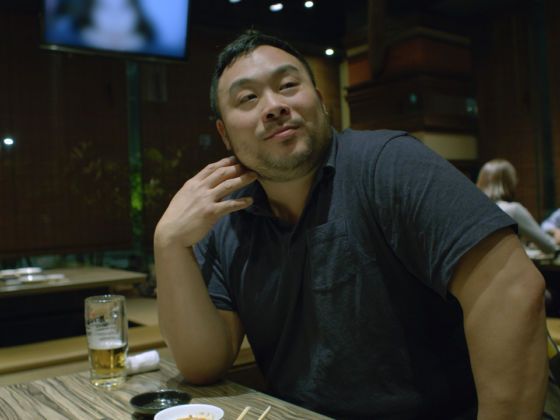There are a few things we know for sure about David Chang. He is an exceptionally successful and ambitious restaurateur. He’s a charismatic (and controversial) television personality. And he seems to know everyone: comedians Seth Rogen, Kate McKinnon, Danny McBride, and Aziz Ansari; television hosts Padma Lakshmi, Bill Simmons, and Chrissy Teigen; and celebrity chefs from Madhur Jaffrey to Tom Collichio. David Chang has a lot of friends. And when Netflix recruited him for two food shows, Ugly Delicious and Breakfast, Lunch, and Dinner, he called them all.

What We Lose When Food Shows Are Celebrity Focused
It’s not just Chang’s shows. The celebrity guest star is now at the center of the formula for hybrid food-and-travel shows. The food has become a conduit through which they have an excuse to talk about themselves and each other.
The host in question — usually a celebrity himself (Samin Nosrat is the sole woman to host a food and travel show in the streaming era and she notably doesn’t indulge in the celebrity guest trap) — recruits his famous friends to eat, drink, and be merry with him. On Vice Media’s food show Fuck That’s Delicious, rapper Action Bronson butchers a tuna with Jonah Hill in Manhattan and samples street food in Rome with Mario Batali. On Chef Show, director and actor Jon Favreau essentially made an entire series out of cooking and eating dinner with his Marvel co-stars. And Breakfast, Lunch, and Dinner is little more than an excuse for Chang to discuss fame and comedy, and sometimes social justice, with his famous friends over extravagant meals. The celebrity guests more often than not have absolutely no connection to the cities the pair visit.
A generous reading of this trend is that the sometimes laborious process of cooking can be made more entertaining with a celebrity guest as a distraction. To be fair, who doesn’t daydream about chatting with Gwenyth Paltrow or Chrissy Teigen over a glass of wine and a decadent meal? The allusion of closeness to fame can be gratifying.
And it makes sense, too, to hitch a familiar face to an unfamiliar cuisine to make it feel slightly more approachable. In the new season of Ugly Delicious, for instance, Padma Lakshmi, host of Top Chef and herself an accomplished chef, educates Chang on the origins of curry. That’s a celebrity appearance that makes sense in the context of the show.
But more often, the constant deluge of familiar faces is a self-indulgent power play. It’s a way of reminding the audience that to travel the world eating the most delicious food on the planet, whether at swanky restaurants or street carts, takes wealth, access, and privilege usually only afforded to celebrities. When food and travel shows are populated by celebrities, it reinforces the assumption that eating well and traveling abroad is the realm of rich people, and that for the rest of us, such a life can only be aspirational.
The second season of Ugly Delicious does a better job of balancing celebrity appearances with expert perspectives than similar shows. Chang has dinner at a steakhouse with the meat-focused chef at the Beatrice Inn, Angie Mar, along with food writers Helen Rosner and Lolis Eric Elie. He invites three of the most accomplished and insightful Indian-American food writers working today, Khushbu Shah, Priya Krishna, and Sonia Chopra, to discuss the colonization of Indian food and to supplement his conversation with Lakshmi. These are the strongest moments of the show, and what we would hope to see more of should the show get a third season. Other times, his focus on celebrity is tone-deaf and arbitrary.
At one point for instance, Chang invites artist David Choe and sports media mogul Bill Simmons to join him for lunch at Outback Steakhouse. The millionaire threesome cosplay as middle class (even though they eventually praise the quality of steak). Simmons is only there it seems, to exaggerate the cliche point that the famous former ESPN host is out of place eating steak at a chain restaurant.
At the risk of sounding self-righteous, Anthony Bourdain rarely, if ever, invited high-profile celebrities on his show to travel and eat with him (Barack Obama being the most notable exception). Instead, local “fixers” joined him — often journalists, musicians, chefs, painters, and poets who were not just intimately familiar with the city in question, but often invested in its social and economic prosperity. Bourdain went to each destination from a place of respect and curiosity. He not only seemed to genuinely care about the history and culture of every place he visited, but he was willing to learn, listen, and ask questions.
The inner lives of the grotesquely rich and famous already oversaturate every aspect of entertainment. People who preserve ancestral recipes and cooking techniques in the aftermath of war and colonialism are much more interesting. So are cooks who operate egalitarian family-owned street food stalls that serve local people among tidal waves of tourism. Stewards of the cuisine of the marginalized, from former slaves to indigenous peoples, are interesting. Activists who understand that no amount of star power can distract from the fact that food and eating are inherently political are interesting.
If celebrities want to talk to each other, they should launch a talk show. Food and travel shows, at their best, investigate how history, social justice, and cultural nuance manifest in the kitchen, and what those traditions mean to regular people. The new season of Ugly Delicious does delve into these subjects, but Chang is still seduced by his own celebrity. Imagine how many bridges of understanding celebrity chefs like him could build if they focused less on fame and more on food.